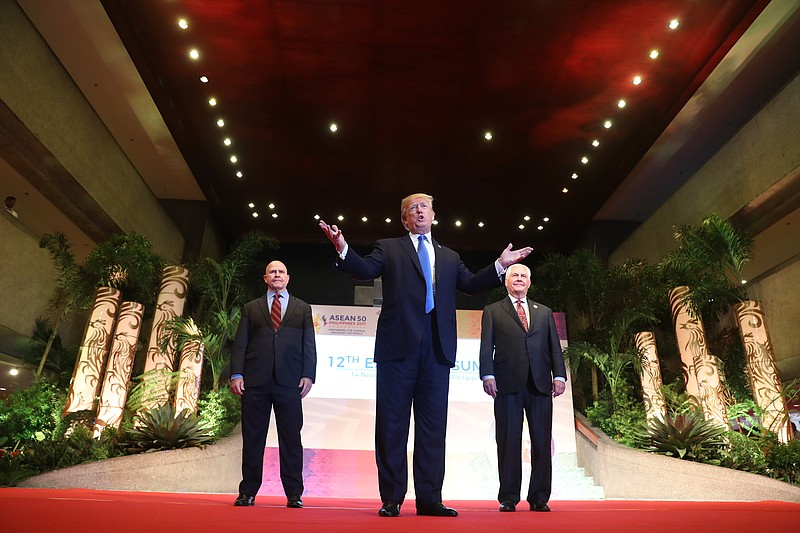On his travels across Asia, President Donald Trump offered himself as a sharp break from presidents past. He pushed regional leaders to reshape trade deals to America's liking, opted against spotlighting human rights abuses and cranked up pressure on North Korea to end its nuclear program.
But for all the pageantry and promises unfurled during his five-nation, 12-day trip, Trump returns to Washington with few concrete accomplishments in hand and leaves uncertain Asian capitals in his wake.
The president pushed a go-it-alone trade policy yet reaffirmed traditional alliances. He cajoled and flattered leaders in Tokyo and Seoul without eliciting firm commitments for a more balanced economic relationship. He opened the door to negotiations with North Korea, but such diplomatic overtures were overshadowed by a tweet that derided dictator Kim Jong Un as "short and fat."
And as regional allies nervously watched for Trump to define the new U.S. approach to the Pacific Rim, the president muddied his message. At a summit in Vietnam, he vowed to hold rising superpower China accountable for unfair business and trade practices. Yet in Beijing, the president said, "I don't blame China" for a growing trade gap.
Trump's unscripted decision to publicly denounce the policies of his predecessors while flattering his Asian hosts underlined his unconventional international approach, one centered on personal rapport and strategic commitments while paying little attention to the guardrails that have long defined U.S. foreign policy.
In the White House view, Trump accomplished what he set out to do: strengthen relationships with world leaders and lay the groundwork for more equitable economic relationships. The president soaked in the lavish welcome ceremonies at each stop and dubbed the trip "tremendously successful."
"I think the fruits of our labor are going to be incredible, whether it's the security of our nations, whether it's security of the world or whether it's trade," Trump said before leaving the Philippines on Tuesday bound for home.
Trump said he'd have more to say about the trip with a "major statement" at the White House this week. But across the Pacific, Trump was reminded of the challenges awaiting him at home.
As Trump and Chinese President Xi Jinping wrapped up their joint statements to the press in Beijing, they ignored shouted questions from American reporters in the Great Hall of the People. When they ducked backstage, Xi summoned his interpreter and posed an inquiry to Trump:
"Who is Roy Moore?" Xi asked.
That moment, described by two White House officials who weren't authorized to speak publicly about private conversations, underscores Trump's domestic challenges. He must grapple with the uncertain fate of his tax cut plan, face the threat of a government shutdown and decide whether to cut ties with Moore, the Republican candidate in Alabama's special Senate race, who is accused of sexually assaulting underage girls decades ago.
For most of the trip, Trump was able to leave domestic affairs behind, though he did reignite the Russia firestorm by revealing that President Vladimir Putin had insisted to him in Vietnam that Moscow didn't hack the 2016 election. Trump added: "And I believe - I really believe - that when he tells me that, he means it." Trump later clarified that he was "with" the U.S. intelligence agencies that concluded Russia was behind the interference.
In Seoul, Trump delivered a sharp warning to North Korea, saying: "Do not underestimate us. And do not try us." But he also, for the first time, signaled a willingness to negotiate with Kim, though he didn't elaborate.
Just as vital as the message Trump delivered to Pyongyang was the one he sent to China, which supplies most of North Korea's economic lifeblood. His message to Beijing: It's time to do more.
At each stop on his trip, Trump both bemoaned the current state of U.S. trade relations in the region and announced new business deals, including more than $250 billion in China. But most of those agreements were older, already agreed-upon or only promises. In Vietnam, he scolded China for unfair trade practices and delivered a forceful advocacy for bilateral trade deals, only to have 11 nations strike a multinational agreement hours later.
Breaking with previous presidents, Trump largely abandoned publicly pressing foreign leaders on human rights. He said nothing about restrictions on civil liberties or press freedoms in China and Vietnam and, most notably, did not rebuke Philippine President Rodrigo Duterte for overseeing a violent drug war that features extrajudicial killings.

